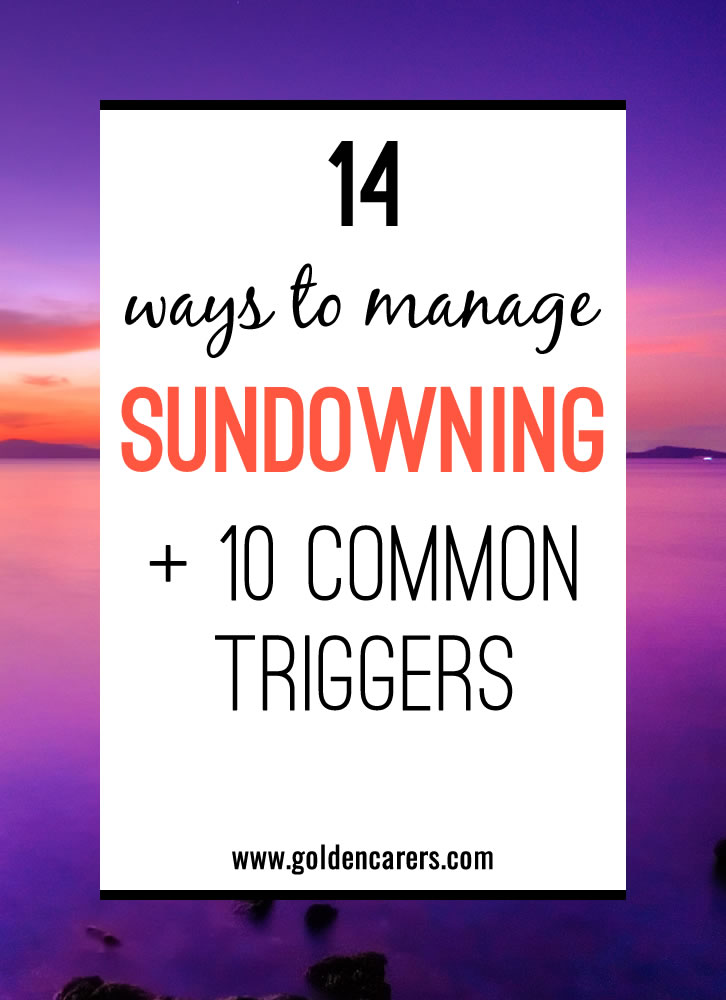
The term ‘sundowning’ or ‘sundown syndrome’ refers to an end-of-day confusion and restlessness that manifests as dusk approaches. This syndrome affects people living with Alzheimer’s Disease and other forms of dementia.
This psychological phenomenon causes behavioural problems that begin to occur as the sun is setting. Those affected may go into a heightened state of aggression or fearfulness, they may suffer from delusions or paranoia and will often begin pacing or wandering.
In this article we cover:
What is Sundowning?
Sundowning Behaviour Management
Common triggers to Sundowning Behaviours
Strategies that may improve Sundowning Behaviour
Related Activities
Comments Post a Comment
Heather  8th Sep 2019
Diversions Therapist
8th Sep 2019
Diversions Therapist
 8th Sep 2019
Diversions Therapist
8th Sep 2019
Diversions Therapist
I have just found these helpful ideas for late stage dementia. I have been looking for so long for help in this area. I work in a dementia wing, in a large activity room on my own with anywhere between 10 and 20 people each day. I am unable to leave this room due to the risk of residents falling. This is very difficult sometimes as the residents will wander and I have to try to accommodate for all forms of behaviour in the room. I am aware that I can’t provide for everyone all the time but it is hard to give my time to one person with so many others needing help. I have been in this job for 12 years and have days where I just run out of ideas to help my residents. I have found this article to be very helpful and it has given me hope of at least improving some of my days and the days of my residents. I thank you very much for your ideas.
Talita  9th Sep 2019
9th Sep 2019
 9th Sep 2019
9th Sep 2019
Thank you so much for your feedback Heather, your feedback means so much to us.
Sandra  19th Sep 2018
Lifestyle Coordinator
19th Sep 2018
Lifestyle Coordinator
 19th Sep 2018
Lifestyle Coordinator
19th Sep 2018
Lifestyle Coordinator
I call this time a winding down time. Mellow music is played, quiet time with massage, colouring and simple watercolours, aromatherapy, atomizer with lavender and lemon works well. I work as 1:1 complex needs support. I have found this technique to be very effective.
Rowena Aupouri
3rd May 2017
hi there,
i find when working in the dementia unit the staffing is not suitable and that is why alot of sundowning becomes more stressful for them and the residents.
music and patience and calmness,m are the best medication and also love, show them you cxare about them.
i find when working in the dementia unit the staffing is not suitable and that is why alot of sundowning becomes more stressful for them and the residents.
music and patience and calmness,m are the best medication and also love, show them you cxare about them.
Amanda  12th Apr 2017
Diversional Therapist
12th Apr 2017
Diversional Therapist
 12th Apr 2017
Diversional Therapist
12th Apr 2017
Diversional Therapist
These ideas are great and when given time would love to try these ideas even though we have a heavy workload afternoon through to late evening. Even though my TAFE acknowledged conditions such as Dementia I am not allowed to use the term Sundowning as where I work they do not believe it exists. We are not encouraged to use the term Dementia either.
carol  7th Jul 2016
lifestyle coordinator
7th Jul 2016
lifestyle coordinator
 7th Jul 2016
lifestyle coordinator
7th Jul 2016
lifestyle coordinator
We have a "twilight program". In a quiet room with older type music playing quietly between 6 to 8 residents depending. Between 2 and 6pm. We play picture bingo, card bingo, read poetry, short and simple exercise, sing a long, do hand massage, play jenga, have a washing basket with baby and children's clothes to sort, ball games, baby stuffed animals, to mention some activities. A group setting, but each has an individual activity. We have structure, but are also very adaptable. Keep each activity going for a short time to maintain attention We have afternoon tea and dinner. Then each resident is collected and taken either to bed or into the lounge. We find this a successful program, also minimising falls. Our "all important paperwork" is then completed. Shift finishes at 7.
Evangeline  19th Jul 2020
Registered Manager
19th Jul 2020
Registered Manager
 19th Jul 2020
Registered Manager
19th Jul 2020
Registered Manager
I absolutely love the idea of a ‘twilight session’ and the timing is exactly correct 2pm to 6pm. I firmly believe that our residents should have additional ‘ activities’ provided at this time , be in one space . I firmly believe it assists with reducing the agitation of sundowning and the high risk of falls . It is so difficult to get owners of care homes to realise the true value of having a ‘full activities program’ and the ways it enhances our residents lives, carers are able to concentrate on other needs and it leads to a happier home where carers are not so stressed, our residents can pick up negativity and this massively impacts on them, owners need to ‘listen’ to their Managers more as we ‘know’ our residents and staff the best, we ‘know’ the importance of building those special relationships in order for a home to thrive.
kathie  8th Jun 2016
activities co-ordinator
8th Jun 2016
activities co-ordinator
 8th Jun 2016
activities co-ordinator
8th Jun 2016
activities co-ordinator
I work in a nursing home, as Div 2 nurse as well as doing activities, it is hard to manage sundowners after activity staff have gone home, as the ratio of nursing staff to residents on an evening shift is 2-15. there is just not enough time or staff to do 1:1 between the hours of 4pm and 6pm. other residents need pressure area care and toileting. would be great if activity staff could be rostered on for afternoon shifts as well.
Solange  10th Jun 2016
Diversional Therapist
10th Jun 2016
Diversional Therapist
 10th Jun 2016
Diversional Therapist
10th Jun 2016
Diversional Therapist
Hi Kathie
I know exactly what you are talking about. Often the nurses are left high and dry by late afternoon and it is not right or fair.
I would recommend bringing up the problem in the Nurses Meeting and trying to extend Activity staff hours.
All the best
I know exactly what you are talking about. Often the nurses are left high and dry by late afternoon and it is not right or fair.
I would recommend bringing up the problem in the Nurses Meeting and trying to extend Activity staff hours.
All the best
Thea  8th Apr 2016
Facility Manager
8th Apr 2016
Facility Manager
 8th Apr 2016
Facility Manager
8th Apr 2016
Facility Manager
I have found that a strategy that "often/sometimes" works depending on the day is to roll activities into one session. Having a calendar of events is just a guide and being prepared to incorporate some simple activities into one helps with agitation. It could be cooking and playing music, or a calm and social gathering, not all our residents are interested or comprehend the designated activity so it is important to understand what suits them as individuals and accommodate as best and as practically as possible.
Jessica  28th Aug 2015
Volunteer and Nurse
28th Aug 2015
Volunteer and Nurse
 28th Aug 2015
Volunteer and Nurse
28th Aug 2015
Volunteer and Nurse
Something I have frequently discovered works well, is to commence something relaxing after lunch, eg music, video, etc in a group setting with the lights dimmed and the enviroment otherwise quiet. Have everyone seated comfortably and offer hand massages. You will be surprised by how many will sleep, and even those who don't will generally be more settled at the end of the hour. :)
Dorothy  30th Jul 2015
Activities Department
30th Jul 2015
Activities Department
 30th Jul 2015
Activities Department
30th Jul 2015
Activities Department
we are finding that short focused activities are working well for the calling out residents, changing the activitty after about 5 min
Jennifer  14th Jul 2015
Lifestyle co-ordinator
14th Jul 2015
Lifestyle co-ordinator
 14th Jul 2015
Lifestyle co-ordinator
14th Jul 2015
Lifestyle co-ordinator
Unfortunately I find sundowners usually require one to one interaction. For those who call out nothing really seems to stop this, because as soon as you leave they start calling out again. They like the physical presence of someone being there . Wanders enjoy having someone to walk with them but once seated again, they jump up and off they go again.Often looking for children, need to go home, get the dinner etc. wanting the usual routine. Its great if you have a good home design with kitchenettes set up, fiddle corners, games set up with instruction on box for \staff to initiate, washing basket in a wheelie trolley, clothes horse to hang out the washing. I found when setting areas up like this we had the best result. I alwasy find it best when you have open door to the outside so they can safely wander and try themselves out with regular walking. I also found sitting in a giant circle with exercise ball to kick from one to another was a great calming activity before tea time, despite the fact it;s roundy and fun.
Clare  25th Jun 2015
Respite Option Facilitator
25th Jun 2015
Respite Option Facilitator
 25th Jun 2015
Respite Option Facilitator
25th Jun 2015
Respite Option Facilitator
Find out from family what the person use to do at that time maybe a bar man,set up a bar sceane,Mummy bathing kids set up a bath scene with a doll and a kitchen.Sport activies for men.All very nice strategies set above however all missing the pointFamiliar routines they use to do before their ailments.


 How to Form Community Partnerships
How to Form Community Partnerships
 How to Create a Culture of Happiness
How to Create a Culture of Happiness
 18 Ways to Bring Live Theater to Your Community
18 Ways to Bring Live Theater to Your Community
 Implicit and Explicit Bias in Senior Care
Implicit and Explicit Bias in Senior Care

 United States
United States